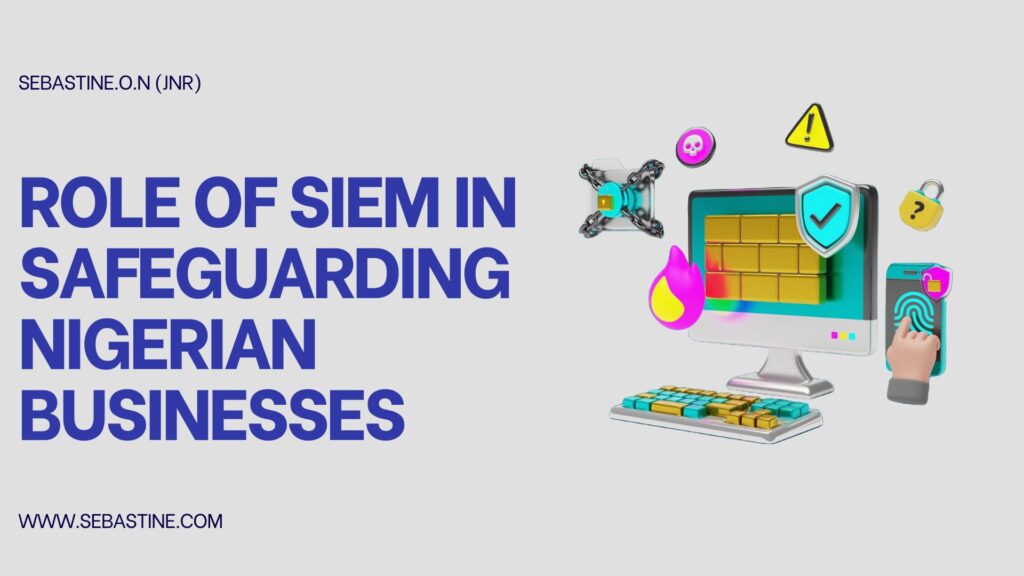As Nigerian businesses transition to digital operations, cybersecurity remains a critical priority. Security Information and Event Management (SIEM) systems play an indispensable role by combining Security Information Management (SIM) and Security Event Management (SEM) functions into a unified security platform. SIEM equips organizations with real-time monitoring, threat detection, and response capabilities that are essential for safeguarding data and infrastructure. Sebastine, a seasoned Information Security Engineer, delves into how SIEM operates and its vital benefits for Nigerian companies.
What is SIEM?
Security Information and Event Management (SIEM) integrates two essential functions for enterprise security:
- Security Information Management (SIM): Collects, stores, and analyzes security data from across the network.
- Security Event Management (SEM): Correlates and analyzes event data to detect and respond to threats in real-time.
Modern SIEM solutions have evolved to include advanced technologies like Security Orchestration, Automation, and Response (SOAR) and User and Entity Behavior Analytics (UEBA) to automate responses and enhance threat detection.
How SIEM Works: Core Components and Functionality
SIEM systems offer comprehensive visibility into an organization’s security status by collecting and analyzing data across its IT environment. Here’s how it functions:
- Data Collection and Aggregation: SIEM tools collect log data from servers, firewalls, applications, and other security systems across the network.
- Data Normalization: Organizes data into a standardized format, making analysis more efficient and accurate.
- Correlation and Analysis: Correlates log data to identify potential threats, such as abnormal access patterns or repeated login failures.
- Alerting and Notifications: Detects and flags potential threats, sending alerts to IT teams for swift action.
- Reporting and Compliance: Generates detailed reports essential for regulatory compliance, including Nigeria Data Protection Regulation (NDPR) adherence.
Why SIEM Matters for Nigerian Businesses
For Nigerian businesses, SIEM offers significant value, empowering organizations to proactively detect and respond to cyber threats while maintaining compliance:
- Proactive Threat Detection: SIEM tools continuously monitor data, detecting suspicious activity early to allow timely mitigation.
- Reduced Incident Response Time: SIEM’s real-time alerts and insights enable security teams to respond promptly, reducing the impact of potential incidents.
- Regulatory Compliance: Compliance with NDPR and other data protection regulations is facilitated by SIEM’s detailed reporting capabilities.
- Centralized Security Visibility: SIEM centralizes security data, giving IT teams a holistic view of the organization’s security status across all systems.
Key Benefits of SIEM for Nigerian Businesses
SIEM’s benefits support both security and operational efficiency, making it a valuable asset for Nigerian companies:
- Cost Efficiency: Automation reduces the need for large security teams, helping businesses manage security costs effectively.
- Improved Business Continuity: Swift incident response enabled by SIEM minimizes downtime, preserving customer trust and revenue.
- Threat Intelligence Integration: Many SIEM solutions integrate with global threat intelligence feeds, providing insights into emerging threats relevant to the organization’s sector.
Challenges in Implementing SIEM and Solutions
Implementing SIEM comes with certain challenges, but they can be addressed for successful deployment:
- Resource Intensive: Skilled personnel and significant resources are needed for SIEM’s effective use. Outsourcing SIEM management can ease resource demands.
- Data Overload and False Positives: SIEM can generate numerous alerts, including false positives. Regularly tuning SIEM rules and configurations can reduce these unnecessary alerts.
- Integration with Existing Systems: Compatibility with existing systems is crucial. Choosing SIEM solutions that support diverse data sources and formats ensures seamless integration.
Conclusion
For Nigerian businesses, SIEM provides an invaluable layer of protection beyond traditional cybersecurity measures. By consolidating security data and offering real-time threat detection, SIEM enhances cybersecurity resilience, supports regulatory compliance, and enables rapid responses to threats. Adopting SIEM strengthens an organization’s security posture, helping build trust with customers and stakeholders in Nigeria’s increasingly digital business environment. Embracing SIEM is a strategic step that empowers Nigerian businesses to thrive securely in the digital age.
Call to Action
Secure your business’s digital future today. Reach out to cybersecurity experts to learn how SIEM can fortify your organization against modern cyber threats and streamline compliance efforts.

